Support justice-driven, accurate and transparent news — make a quick donation to Truthout today!
David Pecker, the former publisher of The National Enquirer, testified on Thursday in the New York trial against former President Donald Trump, providing damning details of the scheme to “catch and kill” negative news stories for the then-GOP nominee for president in the runup to the 2016 election.
The Manhattan District Attorney’s office alleges that Trump and his then-fixer lawyer Michael Cohen had largely orchestrated the catch and kill plan to keep salacious stories about his extramarital affairs out of the press before Election Day of that year. Pecker’s role in the plan was to pay for the exclusive rights of these stories but never publish them.
Pecker paid Karen McDougal, a former Playboy model whom Trump had an affair with, $150,000 for rights to her story, which Cohen later reimbursed. Cohen was then reimbursed for his expenditure through the Trump Organization, which the company recorded as being for legal expenses.
Hush money payments are not necessarily illegal on their own. In New York, however, it is illegal to fudge business records in this manner. It becomes a felony level offense when the action is meant to cover up evidence of another crime, which prosecutors say happened, as it’s against federal law to conceal expenses that are directly related to influencing an election.
By paying off McDougal — as well as adult film star Stormy Daniels and a doorman who alleged that Trump had an out-of-wedlock child — Trump and his cohorts were technically making election-related expenses.
Pecker’s testimony demonstrated that Trump’s actions were indeed meant to cover up his affairs without having to document the payments during his run for president.
Pecker recalled, for example, that in 2018, two years after Trump won the election, he believed that the scheme might have been illegal and expressed his concerns directly to Cohen.
“We committed a campaign violation,” Pecker said on the witness stand.
He recounted that Cohen had told him not to worry, assuring him that “Jeff Sessions is the attorney general and Donald Trump has him in his pocket.”
Pecker also testified that Trump was aware that the payments to his mistresses were to help him conceal potentially harmful news from the public.
Recounting a meeting with Trump in January 2017, weeks before he was to take office as president, Pecker said Trump had asked him how “Karen was doing,” referring to McDougal.
“How’s ‘our girl’ doing,” Pecker recalled Trump saying. “I said, she’s writing her articles, she’s quiet, things are going fine.”
Pecker testified that Trump said to him, “I want to thank you for handling the McDougal situation.” Trump also thanked Pecker for “the doorman situation,” he said.
Pecker also responded to prosecutors about a question relating to Trump’s motives.
“Was your principle purpose in entering into the agreement with Karen McDougal to suppress her story so as to prevent it from influencing the election?” prosecutor Joshua Steinglass asked.
“Yes, it was,” Pecker said.
Trump is charged with 34 felony counts in total within the New York-based case. If convicted, he could face up to 20 years in prison, although judges often give shorter, more lenient sentences, including probation, for nonviolent offenders in cases like these, especially for those without prior criminal charges.
Even if Trump isn’t sentenced to prison, however, polling shows that a guilty verdict, in any of the cases against him, would hurt his chances of winning the White House in 2024.
Media that fights fascism
Truthout is funded almost entirely by readers — that’s why we can speak truth to power and cut against the mainstream narrative. But independent journalists at Truthout face mounting political repression under Trump.
We rely on your support to survive McCarthyist censorship. Please make a tax-deductible one-time or monthly donation.
